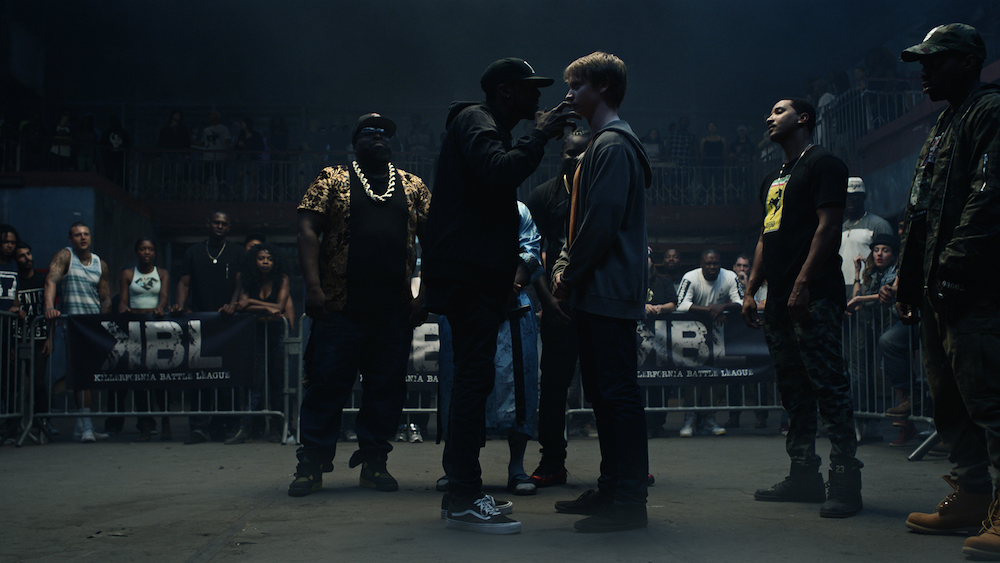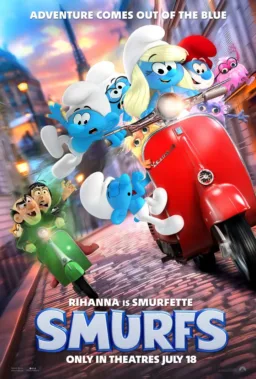Joseph Kahn’s “Bodied” is unlike anything you’ve seen before. It’s a hyperactive action-comedy set in the world of rap battling, where brilliant minds fire jaw-dropping disses at each other and the battleground is a safe space for non-PC culture, no matter how offensive. In a story co-written by Joseph Kahn and Alex Larsen (with a screenplay by Larsen, known as the battler Kid Twist), “Bodied” takes the form of a rap music “Whiplash” as a dorky white kid named Adam (Calum Worthy) becomes the protege to Jackie Long’s character Behn Grymm, a master battler. Adam’s initially teeth-gnashing anthropological interest in the rap battle world (and in the use of n-word) is an impetus for him to genuinely join the competitive world, where his analytical skills become an asset in establishing himself as a rapper.
This is the third feature film by music video director Joseph Kahn, who has always had a sharp eye on pop culture (“Torque,” “Detention”) and makes the experience of rap battling all the more in-your-face with his kinetic filmmaking. Kahn has also written criticism before from his filmmaking perspective, as with this incredibly eye-opening blog post on “The Dark Knight” and action editing. He’s always been a filmmaker to watch out for, and now with “Bodied,” Kahn brilliantly mixes fresh entertainment and cultural criticism.
RogerEbert.com sat down with Worthy, Long, and Kahn to discuss their wildly entertaining film, the preparation that went into coming off like real rap battlers, the blessing this project got from executive producer Eminem and more.
My first question is for you, Joseph: “Bodied” definitely takes place in 2018, but its needle drops are like “new classics” of hip-hop, including J-Kwon, Yung Joc, DMX. Why those songs?
JOSEPH KAHN: There’s a particular era of rap music that has a beat that’s funny to me, quite frankly. Now, rap is not funny. It’s not party music anymore.
What about Soundcloud rap?
No, I think it’s all laid back. The beat feels too laid back. The type of comedy I’m going for is high energy, and with propulsion. At the time I was making the movie, it just felt like the funniest beats to put against a white guy, that era of rap sounded really funny to me. And it seemed like the type of music that he simply should not be listening to.
Jackie and Calum: What scared you the most, and excited you the most about this project?
JACKIE LONG: I don’t think nothing too much scared me about the project, at all. I wasn’t scared to do the project, but the best part was taking the project. I know it’s a very controversial movie, so that was the biggest thing for me, the controversy that it was talking about with free speech. I was happy to take the role.
Did that particularly excite you, the non-PC nature?
JL: The world needs to hear what this movie is talking about. You gotta definitely not be afraid of nothing, so this is like the perfect movie for that.
CALUM WORTHY: The biggest thing that scared me about this project was some of the material that I had to say. Coming from where I was coming from, where I was protected by this major brand for a kid’s network, I was leaving that and suddenly I was putting a lot on the line to tell this story I cared about, knowing that I could face some backlash from my audience, however much I am an artist. And what excited me was the character of Adam, he’s the antihero, almost to the point of being a villain, and with some extremely complex choices. He defends his friends who are rappers for most of the movie, and then ultimately stabs him in the back. It’s like a Shakespearean theme.

How did you guys iron out your rap battles, which are like Shakespearean monologues themselves?
JL: Since the first day we met, it was work. We knew we both had to take each other under each other’s wing and make a good movie. We already knew what was expected, and we knew how this man would craft it. So if we do the right thing and study it and do what we’re supposed to do, we know we’re going to do a good job, and lucky enough he’s such a good sport, he wasn’t one of them actors who’s like, ‘Nah, I’m going to do my own shit, I don’t need this shit’ it was like we really bonded and really went to work. And deep down with the other battle rappers and doing research.
CW: You know it’s a good script when every time you say the words, it triggers that emotion, it takes you to that moment. When I was practicing the raps with the other rappers, I wasn’t able to say the lines without being triggered emotionally, the way I wanted to on set. And obviously you try to keep that for the day, but that’s how you know you’re dealing with a really good script.
Were you guys rehearsing constantly with the battle raps?
JL: On the double rap, that was more of a spontaneous scene, we had the other battle rappers do that. But the other stuff that we had was all written by Alex Larsen, who wrote it word for word. Our words were more telling the story of our characters, the other battle rappers, theirs was their story as well, but they could ad-lib because they’re professionals.
CW: This was a script that was so tight and so smart, it was the smartest script I’ve ever read. I didn’t want to change a single word because every single line pushed the movie forward and the story forward.
It’s almost like doing a basketball movie, but the other actors in it with you are Lebron James and Michael Jordan.
That’s intimidating.
CW: It’s extremely intimidating. And I’m not cool, I’ve never stayed cool in my life.
But when you’re working on that finale, which is like a 40-minute rap battle, how do you keep that energy?
CW: You rehearse it like a play.
JL: You got good background actors as well. They gave us good energy. If we didn’t have them as well, to feed off that energy, we couldn’t have probably done what we done. You need background, and there were some great background actors to give us that energy and to make us really feel like we were battle rappers. Some of the shots that we did sometimes was without them even knowing what we were about to say, and he shot it to capture real cheers. At the end of the day, when we were getting that message from them about how good we was, for me I was like ‘I’m going home to really study and kill this. I got these battle rappers, they’re vouching for us. Shit, this is amazing.” So I thank the background actors as well.
They provide an immense energy.
JL: They hung in with us man, and I thank the background actors. I started with that world, I come from that. I used to do background. And people always ask me, “How did you start?” I say “background acting.” I don’t say ‘extra’ because that’s disrespectful, I’m a background actor. And you can only move up if you take it serious. So, any background actor out there, my message to you is don’t go to set and get at the girls or dudes or go get the food, real ask the actors if you get the opportunity, what classes did you take, what did you do to get into acting? Ask questions, don’t just get in there to meet somebody, really watch the craft of the actor that you like.
Joseph, how did you work with Alex to write the story?
JK: We designed the story; film is architecture. It’s only two hours, and it’s maybe 60 to 100 scenes, so we worked out all of the scenes and motivations, and what should happen and why they happen. You really do think out all of the thematics, before hand. Then some motherfucker has to write that script. And I was off busy. My original intent was actually to cowrite it with him, and I was thinking ‘I’ll do the dramatic stuff, he’ll do the rap stuff.’ And then this dude, has a fucking writing … he’s a literature major. I’m directing all of these commercials and music videos, and then a couple months later he’s like, “Hey, I did a first act.” And I read it, and it was brilliant. I was like, ‘This dude is a better writer than me.’ And I said, ‘Alex, write the rest of the script,’ and there it was.
Why is he not touring with you guys?
JK: He’s hibernating. He’s in a moose barn milking his moose.
JL: He kinda look you!
Is he white?
JK: He’s a white dude who’s in Canada and milking his moose.
CW: Talking about Justin Trudeau.
That’s the energy of the movie: a lit major talking about rap music. Did you guys have a lot of debate about this stuff? There’s so much discussion in the movie it could be its own college course.
JL: We only had 22 days of shooting man, we couldn’t discuss too much shit. We had to really learn our lines, work, go home and get whatever rest we could, and come back to work. The discussion was for the people, the fans.
Doing an interview for this kind of movie seems kind of pointless because it’s not about getting answers. It’s the discussion.
JL: Exactly, we want you to leave the theater and be like, “Wow, did you fucking hear what they said? Oh my god.” That’s what the movie’s about, it’s not about us giving you answers. Everybody got something that relates to them in this movie, everybody. I don’t give a fuck what race you are.
CW: It’s an unusual theatrical experience, because right now content for the most part, is watched individually, we watch it on our own. This is a true group experience, and you want to experience it with a crowd, because it starts conversation. What some people laugh at, what some people get hurt by, that’s what’s exciting about this movie.

Do you guys see that there is a set of rules that do form within the movie? Some definite no-nos? Or is it completely open to non-PC limits?
JK: I think that’s one of the fun parts about the movie, that the rules keep shifting. The rules shift. There are no rules, essentially, because there are no rules to life. What is a civilization? It’s an agreed upon set of terms that we all do to not kill each other, essentially. Because we are predators, human beings are predators. We did not get here and have seven billion people in the world because we don’t kill things, we kill everything. We eat it, we knock animals out of their homes, and kill each other, and each individual civilization, these little communities that we have, are agreements that “we are going to sit next to each other and we’re not going to kill each other.” That’s it. Period.
We’re just going to get along. And not offend each other.
Right. So then we have different communities get together, and the actual act of battle rapping is this wonderful, interesting metaphor for how we can essentially start poking each other for the kill, but stop. When you insult somebody for fun, and they accept, you’re literally challenging them not to kill you.
… Joseph, what kind of books are you reading these days? What podcasts are you listening to?
JK: I can go check my Kindle.
Jackie and Calum: What kind of blessing did you guys get from executive producer and music supervisor Eminem?
JL: He gave Joseph more advice than he gave us, and he gave Joseph advice on the movie, pointer tips, stuff on the actors, who they are. I never got to speak with him, the only thing I know about him through Joseph, is that he thought that me and Calum was real battle rappers.
CW: The best part about having him involved in this film was knowing that we get his stamp of approval. Because I think that for fans of rap, they’re always wanting to make sure its legitimate when actors are portraying a rapper. With Eminem involved, we weren’t going to make this film unless one of the greatest battle rappers, if not the greatest battle rapper of all time was approving it, and making sure that it was legit and authentic.
JL: When he thought that we were battle rappers, I mean, that’s when you know that the movie was good. We not no damn battle rappers.
JK: You want my reading list? The Stranger by Albert Camus, Fantasyland by Kurt Andersen, Leonardo da Vinci biography by Walter Isaacson, Cognitive Semiotics of Film by Warren Buckland. The Wall by Sartre.
So you got some existential shit, and semiotics, but you’re also interested in pop.
JK: Buckland’s best book is his one on Steven Spielberg, it’s really funny.
Are you going to do any more criticism?
JK: I spoke at Stanford, like six months ago and taught a bunch of film classes there. And they want me to be an artist in residency, but I don’t have time.
“Bodied” opens in select theaters on Friday, November 2. It will debut on YouTube Premium on Wednesday, November 28.












